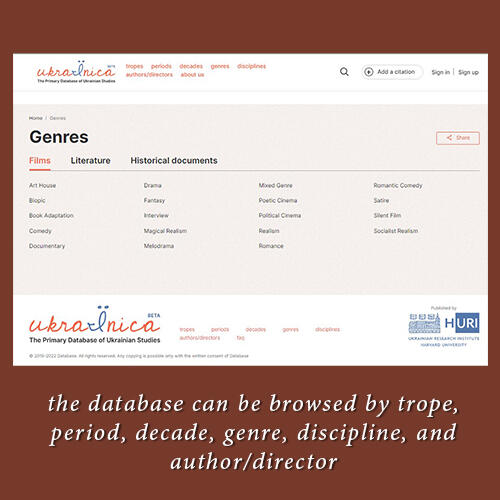In partnership with the Ukrainian Institute, the Ukrainian Research Institute at Harvard University (HURI) has launched the Ukraïnica platform. The platform is building a database of high-quality English translations of Ukrainian literature, historical documents, and films, providing a collection of the best Ukrainian poetry, authors, and films in English.
Everyone can browse Ukrainian literature, movies, and historical documents in English by genre, trope, period, decade, discipline, author, or filmmaker. Moreover, every user can submit art and other resources that are not yet on the platform with a link.
Currently, the Ukraïnica platform includes more than 200 primary and secondary sources. Every item has a short description and active links where the source can be directly accessed, purchased, or borrowed. Moreover, educators and researchers can also use a syllabus-building tool for creating and exporting editable reading lists with references for primary and secondary course materials. These reading lists can be helpful for those designing courses on Ukrainian studies or willing to include Ukraine in their curriculum.

The platform invites scholars from around the world interested in Ukrainian studies to submit literature, poetry, films, and documents in English not yet included in the database directly through the website. These inputs will enable the platform to grow and develop into a comprehensive database. Additionally, it can also help to determine which Ukrainian literature, films, and documents are already available in high-quality English translation and which are not. Adding references in various languages may expand the database in the future.

Oleh Kotsyuba, HURI Manager of Publications, who serves as the Project Director, envisioned and implemented the Ukraïnica project. Sandra Joy Russell, Visiting Lecturer in Gender Studies at Mount Holyoke College, is the Project Editor.
“This is a new user-facing digital product that I’ve been actively working on for the last three years and dreaming about for at least 10 years,” Kotsyuba said about the project. “The main idea behind this platform is to help those outside the field of Ukrainian studies who would like to include topics on Ukraine in their teaching. With the full-scale Russian invasion of Ukraine of February 24, this has become even more urgent because one of Putin’s goals has been to eradicate Ukraine and Ukrainians by destroying the country and killing the people, while erasing its history and culture.“
 The platform already displays and allows access to about 30 films shot in Ukraine or related to Ukraine.
The platform already displays and allows access to about 30 films shot in Ukraine or related to Ukraine.
Among the best Ukrainian films in English is Shadows of Forgotten Ancestors, based on Mykhailo Kotsiubynsky’s novel tells the love story of Ivan and Marichka living in the Hutsul village in Ukrainian Carpathians, a classic of Ukrainian magical realist cinema.
Also, the Ukrainian film Zvenygora is from 1928 is also in English. This film is considered a silent revolutionary epic. It connects millennia of Ukrainian history in one man searching for ancient treasure. 1929 silent film The Man with a Movie Camera by Dzyga Vertov shows daily life in a Soviet city in the late twenties — mostly in Odesa on the Ukrainian coast of the Black Sea.
Researchers have yet to incorporate dozens of contemporary Ukrainian films into the platforms.
“Man with a Movie Camera”: One day of a 1920’s Ukrainian city in the early Soviet times
In the section on historical documents, the platform includes, among others, Internationalism or Russification: A Study in the Soviet Nationalities Problem work by Ukrainian intellectual and dissident Ivan Dziuba, published in 1968. Because he questioned the underpinnings of the Soviet regime, he was imprisoned for 18 months. In his work, Dziuba argued that the Communist Party and Soviet government had taken the position of Russian great-power chauvinism under Stalin while falsely presenting its political philosophy as internationalism.
Originally from the eastern Ukrainian region of Donbas, Ivan Dziuba died at the age of 90 in his sleep on 22 February 2022, a few short hours after Putin officially recognized the “independence” of Donbas as a pretext to start its aggressive against Ukraine on 24 February 2022.
In memoriam: Donbas dissident Dziuba, jailed by USSR for challenging Russian imperialism
The Ukraïnica platform also includes classic Ukrainian literature, including the most known pieces such as Ivan Franko’s poetry and prose, a Collection of the Works of Lesya Ukrainka including The Forest Song, and Ukrainian folk texts. With about 160 items of Ukrainian literature in English, the database is still far from complete.
“I very much hope for the help from all of you in populating the database with high-quality translations into English of Ukrainian literary works, historical documents, and films,” Kotsyuba says.
Read also:
- The rebirth of Ukrainian literature and publishing: famous contemporary authors and new policy for their support
- Ukrainian music about Russia’s war: a tale of struggle, pain, power, and courage
- Beyond Go_A: a playlist and guide to modern Ukrainian folk music
- For the first time, Ukraine will sponsor translations of Ukrainian literature to foreign languages
- Takflix: a platform where you can finally watch Ukrainian films online
- Nine powerful films about Ukraine to add to your watch list
- Phone app brings 40 Ukrainian classical composers into your pocket
- A taste of Ukraine’s poetic Renaissance executed by Stalin
- Ukraine’s Executed Renaissance and a kickstarter for one of its modern successors
- A short guide to the linguicide of the Ukrainian language | Infographics
- Taras Shevchenko. The case of a personal fight against the Russian Empire




